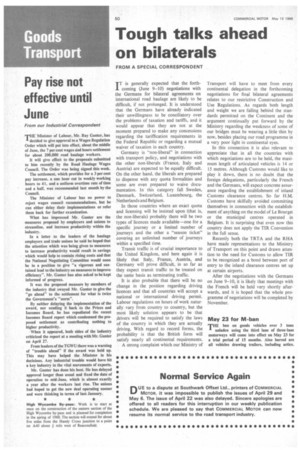Tough talks ahead on bilaterals
Page 52

If you've noticed an error in this article please click here to report it so we can fix it.
FROM A SPECIAL CORRESPONDENT
TT is generally expected that the forth1 coming (June 9-10) negotiations with the Germans for bilateral agreements on international road haulage are likely to be difficult, if not prolonged. It is understood that the Germans have already indicated their unwillingness to be conciliatory over the problems of taxation and tariffs, and it would appear that they are not at the moment prepared to make any concessions regarding the tariffication requirements in the Federal Republic or regarding a mutual waiver of taxation in each country.
Germany is "non-liberal" in connection with transport policy, and negotiations with the other non-liberals (France, Italy and Austria) are expected to be equally difficult. On the other hand, the liberals are prepared to dispense with any quota formalities and some are even prepared to waive documentation. In this category fall Sweden, Denmark, Switzerland, Luxembourg, the Netherlands and Belgium.
In those countries where an exact quota and licensing will be insisted upon (that is, the non-liberals) probably there will be two types of licences made available—one for a specific journey or a limited number of journeys and the other a "season ticket" covering an unlimited number of journeys within a specified time.
Transit traffic is of crucial importance to the United Kingdom, and here again it is likely that Italy, France, Austria, and Germany will prove difficult, in so far as they expect transit traffic to be treated on the same basis as terminating traffic.
It is also probable that there will be no change in the position regarding driving licences and that all countries will accept a national or international driving permit. Labour regulations on hours of work naturally vary from country to country, but the most likely solution appears to be that drivers will be required to satisfy the laws of the country in which they are actually driving. With regard to record forms, the probability is that the British form will satisfy nearly all continental requirements.
A strong complaint which our Ministry of Transport will have to meet from every continental delegation in the forthcoming negotiations for final bilateral agreements relates to our restrictive Construction and Use Regulations. As regards both length and weight we are falling behind the standards permitted on the Continent and the argument continually put forward by the Ministry regarding the weakness of some of our bridges must be wearing a little thin by now, besides placing our road programme in a very poor light in continental eyes.
In this connection it is also relevant to appreciate that in all the countries with which negotiations are to be held, the maximum length of articulated vehicles is 14 or 15 metres. Although Customs would like to play it down, there is no doubt that the foreign delegations, particularly the French and the Germans, will expect concrete assurance regarding the establishment of inland Customs clearance centres. So far H.M. Customs have skilfully avoided committing themselves in connection with the establishment of anything on the model of Le Bourget or the municipal centres operated in Belgium. It is surprising that even now this country does not apply the TIR Convention in the full sense.
Recently both the TRTA and the RHA have made representations to the Ministry of Transport on this point and drawn attention to the need for Customs to allow TIR to be recognized as a bond between port of entry to the inland clearance centres set up at certain airports.
After the negotiations with the Germans on June 9-10, it is likely that meetings with the French will be held very shortly afterwards, and it is hoped that the whole programme of negotiations will be completed by November.
May 23 for M-ban
TfIE ban on goods vehicles over 3 tons unladen using the third lane of three-lane motorways will come into effect on May 23 for a trial period of 15 months. Also barred are all vehicles drawing trailers, including artics.




















































































































































